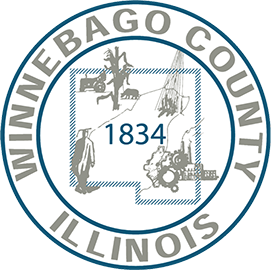About the CJCC
In June 2018, Winnebago County, Illinois formally established its Criminal Justice Coordinating Council (CJCC). Through coordinated leadership, CJCC members work to identify and address emerging and existing criminal justice system issues. The Council works to improve and establish policies that are research based, technologically advanced, effective and work to break the cycle of crime.
The Winnebago County CJCC uses a data-guided planning process to identify, analyze, solve and manage criminal justice system issues. Technical assistance in the form of research and analysis is provided by Loyola University Chicago’s Center for Criminal Justice Research, Policy and Practice.
Membership
The voting members of the Council are a member due to the position they hold. The following members will serve on the Council for as long as they occupy the position:
- Chief Judge, 17th Circuit Court*
- Presiding Judge, Criminal Division, Winnebago County Circuit Court*
- Supervising Judge, Winnebago County Juvenile Courts Division
- State’s Attorney, Winnebago County*
- Public Defender, Winnebago County
- Director of Court Services, Winnebago County
- Trial Court Administrator, Winnebago County
- Superintendent, Winnebago County Jail
- Chairman, Winnebago County*
- Mayor, City of Rockford*
- Chief of Police, City of Rockford*
- Sheriff, Winnebago County*
- Chief Information Officer, Winnebago County IT
- Representative, Illinois Department of Corrections
- Branch Chief, U.S. Attorney’s Office, Northern District of IL, Western Division
- Parole Board Member
* Denotes Executive membership




